 by Jill Magi
by Jill Magi
These climacteric times: households drained and precarious, earth and creatures endangered, battlefields new and old, borders walled, the privatization of nearly everything, power and violence so well-groomed and stealth it covers its tracks quickly, fear as first response. There are large-scale losses and shifts looming. There is also the singular event of last breath, and a lover, family, and community mourns.
After loss, a ridge juts up out of the landscape: one surface drops down deeper into earth, the other pushes up into the sky. The ridge a scar interrupting life-as-it-is, intercepting the tumbling forward of worn-out words, slowing the speed of habitual response. During these times, the living may see things vividly, as if everything is new, and our hearts may open further than we could have imagined possible. Do some among us need to cross to the other side to do the work of the heart? I don’t know, but March of 2016 brought us one of the earliest springs in a long time, and thinking about C. D. Wright’s work brings this question to my mind.
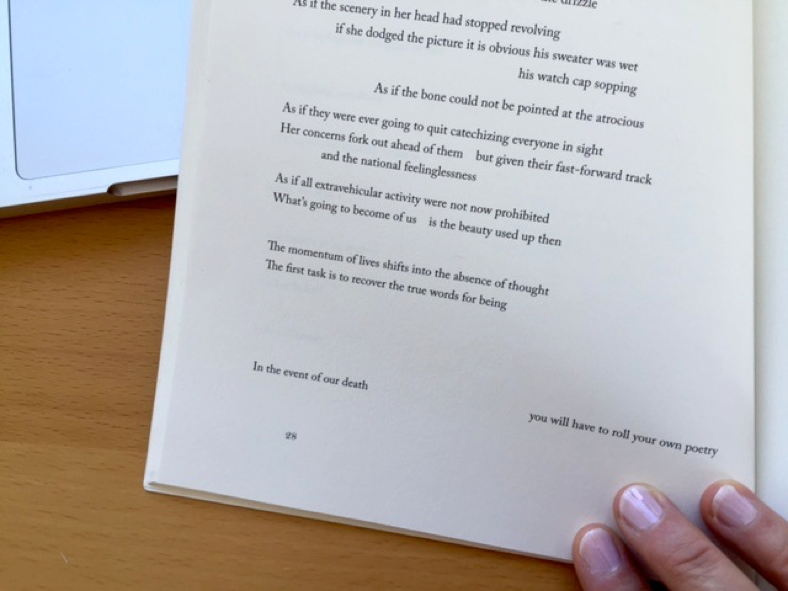
It is fine for poetry to perform experiments, to get lost in its own sounds; it is fine for poetry to disengage from narrative, to push out toward the domain of the impossible; it is fine to play with concepts; to squeeze the silence out of language or squeeze language from silence; fine to suppress the I and chase it into near invisibility; to seek fame in the world of poetry and among writers; it is fine to work hard at poetry and to be clever, hip, to be right and righteous. Everything that is should be—
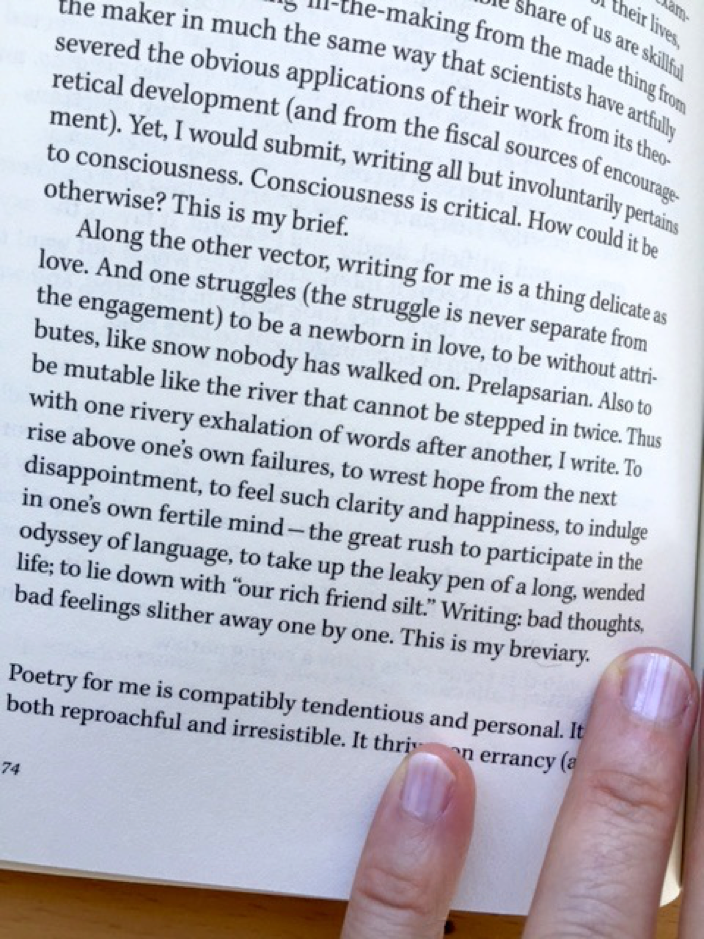
But increasingly I need the poetry that C. D. Wright made: poetry that puts the self in the now and on the page, in and near the conflicts of our times, with a leap, with a vulnerable heart, with others. Sensing, but not in the name of sensation collecting and showcasing. Poetry noticing the lives of others who are remarkable despite not being widely remarked upon. Poetry that says, if you ever sit at the bedside of a loved one passing into the light, poetry may be your training, and if that is all it is for, that is enough.
For about twelve years I have sat with C. D. Wright’s books, tracking her word choices, her syntax. Her forms: a practice of tidy un-tidiness, never too procedural, never too plain. Her anti-institutional, no-single-poetry-movement textures. The arrangement of the speech of others: I’ve tracked these themes of hers, waited for her next book’s subject. Her books necessary as feathers for flight, even if, when teaching and writing about her work, I have pulled out the intense, earth-bound words “ethics” and “representation.”
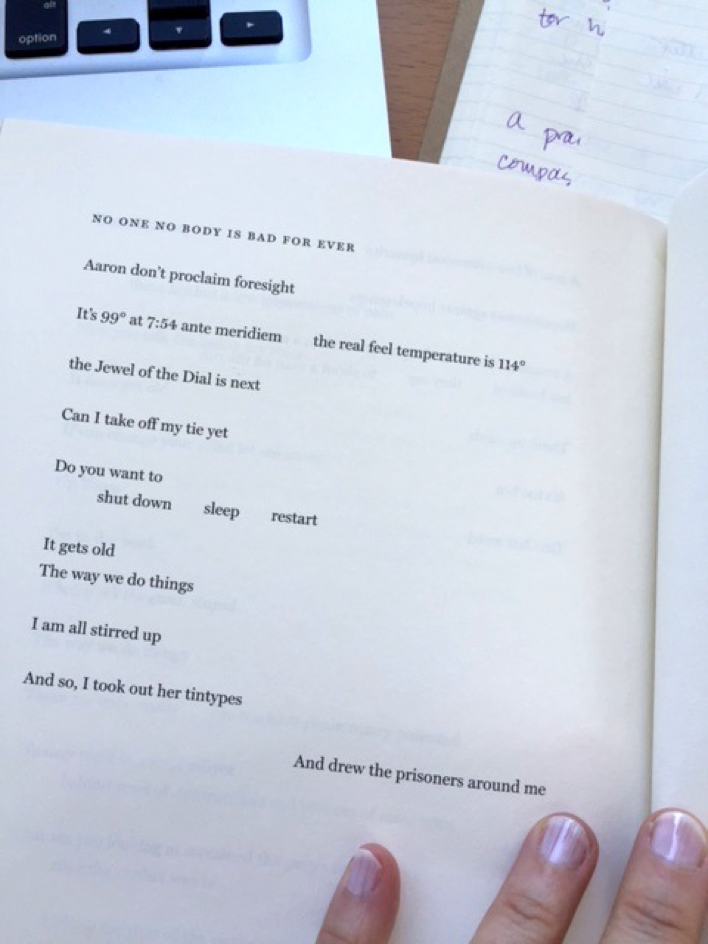
Some would call it a risky gambit: to write down the speech of others, moving their words through your mouth, your pen, incorporating them into your own body/book so as to advance the idea of “one big self.” I admired C. D. Wright for the courage to do this. As a kind of poet-biographer, her works are evidence of a confident, recursive practice of the collective, as if collectivity could never exist without repeated attempts to inhabit the “other.” The representation police, as she might call them, might raise warning flags at this approach and its textual results, but I think C. D. Wright went ahead writing this way because she knew that many lives outside the drawn boundaries of “literariness” were lives lead through poetry; these so-called others were her kin in this way.
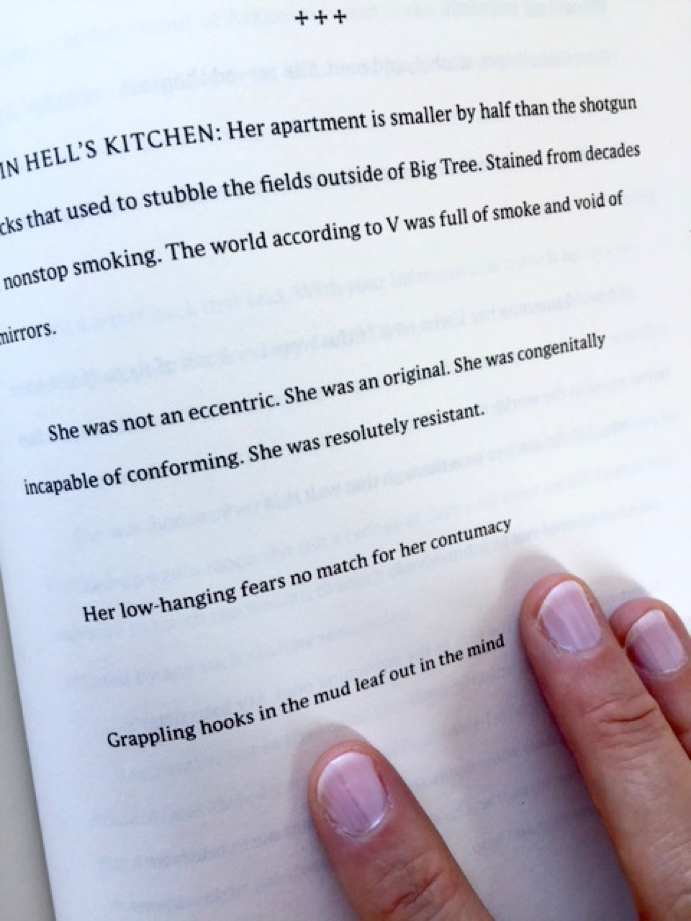
There are poets out there among us who will never write a single word. How many of us believe this? How many of us think that our craft is so difficult that it takes a certain intelligence and commitment to enter the workshop, to enter into print? C. D. Wright kept reminding us that if we would listen to the person at the bus stop or next door who doesn’t give a shit about being published, who takes risks in language and life, who knows certain things and expresses them in a certain way, we might learn how to live.
When I was trying to write my first book, teaching myself how to go down a crooked road, as she might call it, away from the novel and toward a manuscript that wanted to be unruly, I don’t remember how, but I found Deepstep Come Shining. Maybe I was browsing at St. Mark’s Books before the intensity of a Poetry Project reading down the street, scanning the spines of books for the insignias of presses newly on my radar—
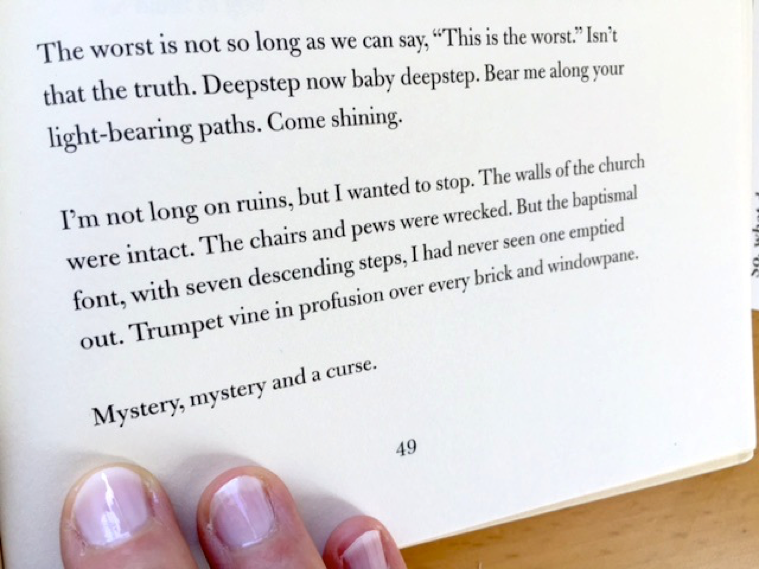
I did not understand Deepstep Come Shining, its title, the logic behind the section breaks, the voice or voices. I could not explain any of it but through electric attraction. I read and re-read, carried away each time on its sounds, feeling close to home. No, I’m not from the South, and I am wary of anything romantic about this word “home”—as if we’re never making it exactly where we are. But class and race and other divisions inflected with inequality’s pain exist, and C. D.’s work reminds us that estrangement from our “home place” may be foisted upon us by world events and foisted upon some of us daily as we head down supposedly open highways, as we cross town to go to a job, to school, as we cross borders seen and unseen.
No society can measure up to its ideals of peace and equality, but on how to navigate the inevitability, complexity, and the violence of difference, and how to find the language of poetry at the crossings, I keep turning to C. D. Wright. Reading her, I notice the tracks dividing one part of town from the other are tracks that run right through me.
I come from church culture, from a refugee father who has an accent and a strange name, from a mother whose soft “r” sounds revealed her New York City social class no matter how silky her home-sewn dresses were. From North Jersey where people like to talk even though they are usually in a hurry. Where the syntax and lexicon of the King James Bible lived alongside the art of kvetching about traffic or an outrageous number on a price-tag, where if your humor doesn’t have an element of self-deprecation, you are not considered trustworthy. My incidental training in storytelling, poetry.
So when I got the cold shoulder at poetry venues—this seems to be a rite of passage, so why should I be exempt?—or when I couldn’t follow the literary references at a dinner party, I could go to C. D. Wright’s work in order to remember what I wanted poetry for: to be unafraid of border crossing, allowed to be “rudimentary,” intuitive, allowed to be wrong and to be wronged, to be unafraid of being a lifelong student, and unafraid to partake in poetry’s feast even while some seats at the table are reserved and appear to come at a high price. But if I ever became too wedded to the idea of myself as a poetry outsider, her work reminded me that even that position is accompanied by distance and hubris—better to let go of rigid identities and jump into the exuberance of writing with others.
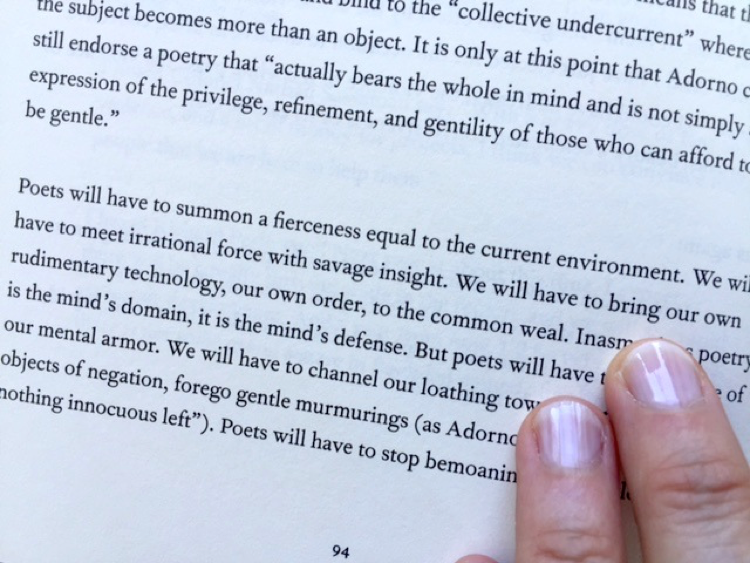
Was being a public poet, keeping up with the debates, leading a life that may have taken her away from the humor and survival linguistics beyond institutions and official poetry communities—was the work of poetry hard, heavy, alienating at times?
When I walk in Abu Dhabi, my new city, I notice that certain workers here—the ones who are slotted into the lower paid jobs through agreements between nations—are often together in the evening, sitting on the front steps of someone’s shop, at street level, cutting up late into the night. C. D.’s work reminds me to listen and to see this. But the realization of my distance from extroverted Abu Dhabi can be a little painful. Here, people like me are tucked away up inside high-rise apartment buildings, writing at spacious desks, while the real-time word workers practice their art in the street and get immediate feedback. I like to think that if C. D. Wright had visited my city she would have found the poetry on the dusty and hot street, and then she would have accompanied me up to the 27th floor where we would have talked about the view from above and the echoes of the speech events and tones below. What poetry would come from our travels between?
I deeply admire C. D. Wright’s work, and through it, I hope to keep holding this imaginary conversation with her, carrying forward, with others, her way of poetry, shining.
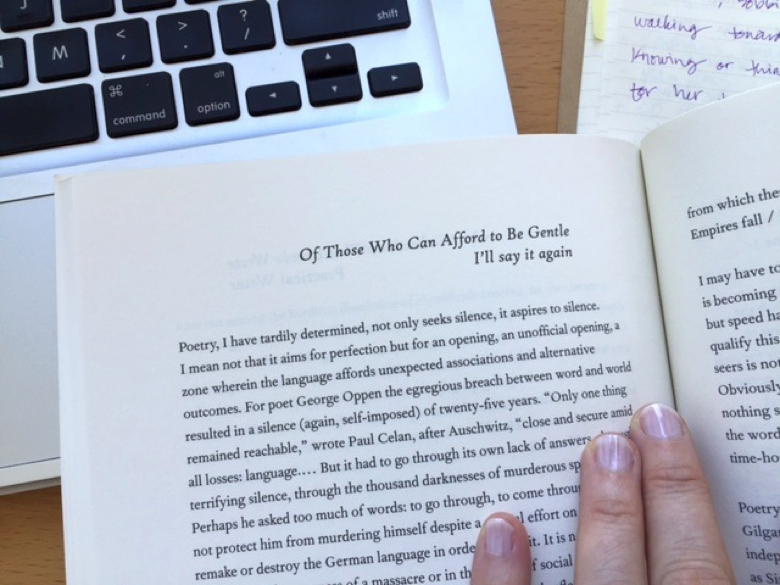
[In order of their appearance, pages photographed are from C. D. Wright’s books Rising, Falling, Hovering; Cooling Time: An American Poetry Vigil; One Big Self: An Investigation; One With Others; Deepstep Come Shining; and the last two are both from The Poet, the Lion, Talking Pictures, El Farolito, a Wedding in St. Roch, the Big Box Store, the Warp in the Mirror, Spring, Midnights, Fire & All.]
